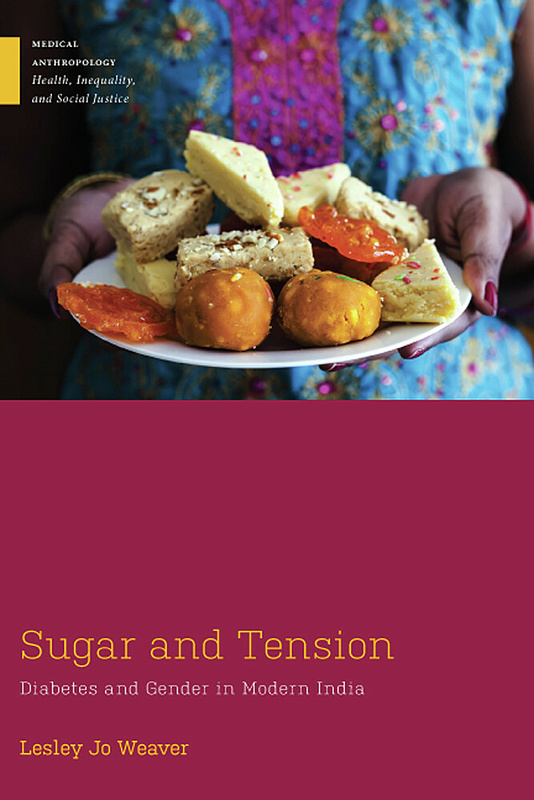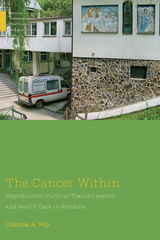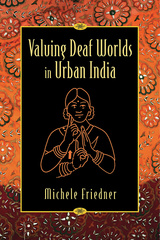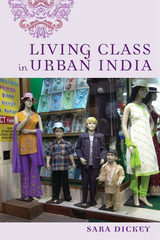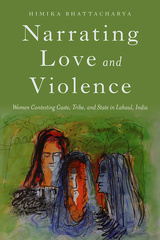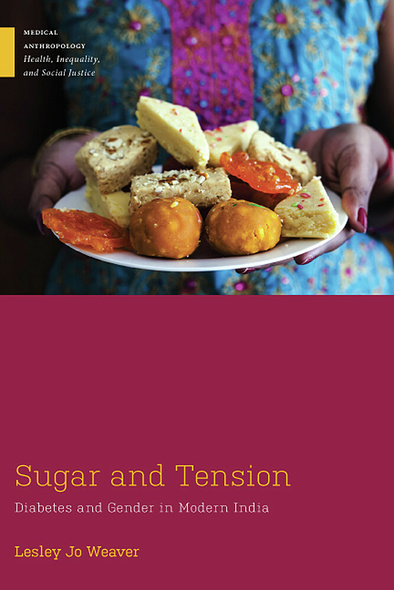
202 pages, 6 x 9
5
Paperback
Release Date:10 Dec 2018
ISBN:9781978803008
Hardcover
Release Date:10 Dec 2018
ISBN:9781978803015
Sugar and Tension
Diabetes and Gender in Modern India
SERIES:
Medical Anthropology
Rutgers University Press
Women in North India are socialized to care for others, so what do they do when they get a disease like diabetes that requires intensive self-care? In Sugar and Tension, Lesley Jo Weaver uses women’s experiences with diabetes in New Delhi as a lens to explore how gendered roles and expectations are taking shape in contemporary India. Weaver argues that although women’s domestic care of others may be at odds with the self-care mandates of biomedically-managed diabetes, these roles nevertheless do important cultural work that may buffer women’s mental and physical health by fostering social belonging. Weaver describes how women negotiate the many responsibilities in their lives when chronic disease is at stake. As women weigh their options, the choices they make raise questions about whose priorities should count in domestic, health, and family worlds. The varied experiences of women illustrate that there are many routes to living well or poorly with diabetes, and these are not always the ones canonized in biomedical models of diabetes management.
This book is a must read not only for scholars and public health practitioners wanting to understand how women in contemporary India experience and respond to diabetes; but a broader audience interested in what ethnographies of chronic illness can tell us about gender roles, women’s life priorities, and challenges to their wellbeing across the life course.
'Sugar and Tension is a poignant ethnography that reveals how middle-class women in urban North India grapple with a mounting diabetes epidemic in the midst of shifting expectations and opportunities for women. Women with diabetes in Delhi often act in ways that run counter to biomedical recommendations. Weaver helps us to understand why, through her account of structural constraints that women face, and by showing how women justify their actions as they leverage ideas about relationships among diabetes, tension and self-sacrifice to engage in both social critique and self-validation. This book makes an important contribution to the studies of medical anthropology and gender in South Asia.'
Recommended.
Human Biology Association - Sausage of Science 83- An Excerpt with Dr. Lesley Jo Weaver
https://soundcloud.com/humanbiologyassociation/sos-82-an-excerpt-with-dr-lesley-jo-weaver
This is a book where women's voices sing. It is filled with stories that make an imprint because they are narratively complex, in-depth, and speak to the heart of the issues that center the book: diabetes, the efforts and limitations of self-care, family, and, most importantly, gender....Beautifully articulates the everyday dilemmas women face as they manage competing demands and sometimes contradictory cultural poles as they try to live well, physically, mentally, and spiritually.
A clear and very compelling ethnography that demonstrates how for women in New Delhi, learning to be diabetic is as much about family and global development as it is about individual well-being. Weaver does not set up self-sacrifice and self-care as mutually exclusive possibilities but considers how acts of control and giving hold profound social meaning in North India. Overall, this highly readable book would be appropriate for undergraduate and graduate courses in medical anthropology, global health, biocultural anthropology, and the anthropology of gender.
This book is a must read not only for scholars and public health practitioners wanting to understand how women in contemporary India experience and respond to diabetes; but a broader audience interested in what ethnographies of chronic illness can tell us about gender roles, women’s life priorities, and challenges to their wellbeing across the life course.
'Sugar and Tension is a poignant ethnography that reveals how middle-class women in urban North India grapple with a mounting diabetes epidemic in the midst of shifting expectations and opportunities for women. Women with diabetes in Delhi often act in ways that run counter to biomedical recommendations. Weaver helps us to understand why, through her account of structural constraints that women face, and by showing how women justify their actions as they leverage ideas about relationships among diabetes, tension and self-sacrifice to engage in both social critique and self-validation. This book makes an important contribution to the studies of medical anthropology and gender in South Asia.'
Recommended.
Human Biology Association - Sausage of Science 83- An Excerpt with Dr. Lesley Jo Weaver
https://soundcloud.com/humanbiologyassociation/sos-82-an-excerpt-with-dr-lesley-jo-weaver
This is a book where women's voices sing. It is filled with stories that make an imprint because they are narratively complex, in-depth, and speak to the heart of the issues that center the book: diabetes, the efforts and limitations of self-care, family, and, most importantly, gender....Beautifully articulates the everyday dilemmas women face as they manage competing demands and sometimes contradictory cultural poles as they try to live well, physically, mentally, and spiritually.
A clear and very compelling ethnography that demonstrates how for women in New Delhi, learning to be diabetic is as much about family and global development as it is about individual well-being. Weaver does not set up self-sacrifice and self-care as mutually exclusive possibilities but considers how acts of control and giving hold profound social meaning in North India. Overall, this highly readable book would be appropriate for undergraduate and graduate courses in medical anthropology, global health, biocultural anthropology, and the anthropology of gender.
Weaver identifies this tension between self-care and societal demands in women in India and offers a way forward for all, with generalizable lessons for anyone dealing with a chronic disease. Sugar and Tension provides a unique and incisive view of diabetes in modern India, and highlights the potential for women to change their own place in society.
Lesley Jo Weaver is an assistant professor of medical anthropology in the department of international studies at the University of Oregon in Eugene.
Table of Contents
Acknowledgments
Chapter 1: Opening a Window on Diabetes Experience
Chapter 2: Seeking Modern India
Chapter 3: Balance: The Moral and Practical Work of Diabetes Management
Chapter 4: Tension: Diabetes, Distress, and Mental Health
Chapter 5: Sacrifice: Domesticity and Care Among Women with Diabetes
Chapter 6: Resilience: Living Well with Diabetes
Chapter 7: Conclusions: Diabetes as Life
Appendix
References
Index
Acknowledgments
Chapter 1: Opening a Window on Diabetes Experience
Chapter 2: Seeking Modern India
Chapter 3: Balance: The Moral and Practical Work of Diabetes Management
Chapter 4: Tension: Diabetes, Distress, and Mental Health
Chapter 5: Sacrifice: Domesticity and Care Among Women with Diabetes
Chapter 6: Resilience: Living Well with Diabetes
Chapter 7: Conclusions: Diabetes as Life
Appendix
References
Index

